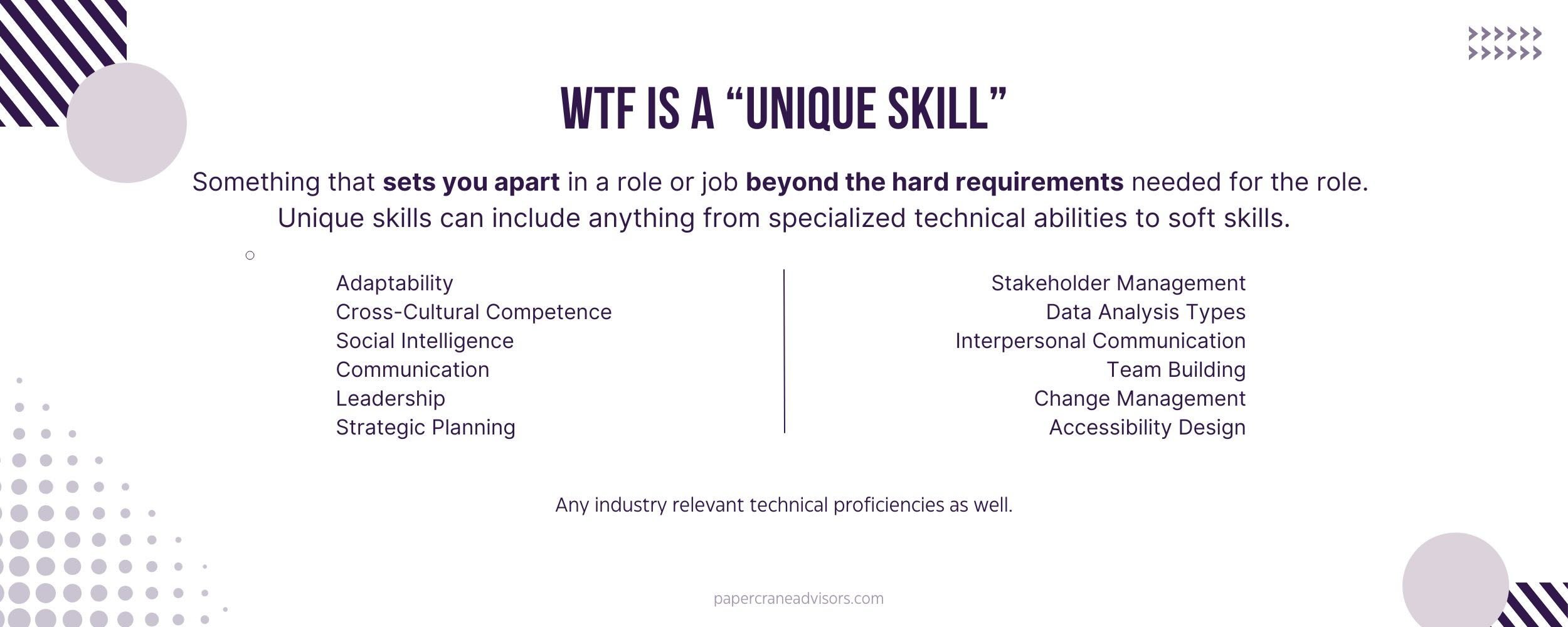Find and Showcase your Unique Skills
Your resume is all about you: who you are and why you’re awesome. Being that it’s about you, you need to highlight the factors that make you “stand-out…” which is what everyone will be trying to do as well. You might suddenly be thinking of the Fight Club quote: “You are not special. You're not a beautiful and unique snowflake.” I feel you. The hardest part about highlighting your “unique skills” is actually know what they are.
The key here is: self-awareness.
This is difficult for a lot of people, especially if you suffer from Imposter Syndrome or have social skill limitations. Let’s talk about some strategies to find your unique skills and how to present them effectively on your resume while also speaking about them.
WTF is a “Unique Skill”
A unique skill is something that sets you apart in a role or job—think of it as the skills you have beyond the hard ones needed for the role as noted in the graphic above. For example: if you’re a graphic designer, you can know your tech skills like Adobe Creative Suite but also can do animation and motion graphics. A unique skill set you might also have have is that you’ve got experience in multilingual communication.
Some of the biggies recruiters are looking for are around the following areas: Action Abilities, Adaptability, Cross-cultural competence, Social Intelligence, Communication, Leadership, and of course, any industry relevant technical proficiencies.
Identifying Your Unique Skills
I’ll discuss the broad ideas of how to ID your skills (Neurotypical Friendly) and then put step-by-step breakdowns below them (Neurodivergent Friendly). Simply put, some people are better at Creating things while others do better Editing. Feel free to choose whatever aligns with your mental way of working.
Self-Reflection - Create
Meditate on a mountain and try and recall about your past experiences, both professional and personal. This sounds easier said than done but here are a few ways to tackle this:
Ask yourself some discovery questions and write what comes to mind: What tasks or projects have I excelled at? What do others often come to me for help with?
Review your Career Progression Map and highlight what you have liked
You’re not alone or expected to find the answers within on a whim: Ask colleagues, mentors, or friends for their input. They might see strengths in you that you hadn’t considered!
Work with a professional coach or therapist to help you see the best in you.
Borrow It - Edit
As the great poet, Ariana Grande, once said “I see It, I like it, I want it, I got it” is wholly applicable here.
Review job postings: What skills are they looking for? Do you have any of those skills, or can you translate your experiences to match them?
Review Profiles and Resumes of people you admire or in similar roles: see how they’ve worded things. Do you have similar skills? Can you adapt it to you?
Lift the JD: if you have the skill (be honest), it’s okay to lift the wording from the job you’re applying for.
The Interwebz: search for some “unique skills” and see what applies to you
The Showcase
Once you’ve identified your unique skills, it’s time to incorporate them into your resume and professional profiles.
Make a dedicated “Skills Section”: Create a dedicated skills section at the top of your resume or in your LinkedIn About section. List your unique skills in bullet points, making them easy to scan, or as a keyword dump online.
Sprinkle into Sentences: Make sure at least one bullet point in job skill section of your roles highlights a Unique Skill of some kind.
Make a “Certifications” section: This is built into sites like Indeed or LinkedIn, but on your resume, it’s great to have a Certifications section. You did the work and earned recognition, make sure it’s not lost.
Here’s an example of a Tech Professional of how to highlight unique skills effectively
Skills Section example: Advanced Python programming | Data Analysis and Visualization | Global Management | Team Leadership
Work Experience Example:
Awesome Tech Company | Senior Software Engineer 2022-Present
Developed and implemented a new data analysis tool, increasing team productivity by 25%.
Led a team of five global developers in a project that reduced system downtime by 40%.
Balanced repetition is crucial. Mention the skill in a skills or certification section, but ensure you have them sprinkled throughout your actual job responsibilities. However, also don’t repeat the same exact phrase 6 times in a row—you can always use a thesaurus!
Filling Skill Gaps
If you truly feel you have unique skill gaps due to how fast a market is moving, technology advancement, lack of growth at a role, or you’re just itching to learn something new, there are many ways (free and paid) for you to close said gap. Some favorites:
Online Courses:
Coursera
Udemy
Codecademy
Skill Share
LinkedIn Learning
Go back to physical or online school such as:
A certificate program at a community college
A degree or a Masters…heck even a PhD if that’s your thing.
Specialized certifications like PMP, etc
Learn a language (either via an app or school program)
Find a coach or mentor in a specific subject
Join industry, meetup, or volunteer groups that offer lessons in something you’re trying learn
The Skills That Pay the Bills
Highlighting your unique skills on your resume can significantly enhance your chances of landing that job you’re after. By identifying, showcasing, and tailoring your skills, you can create a compelling narrative that sets you apart. If you feel like you don’t have those skills you want, you can always learn. #student4life

